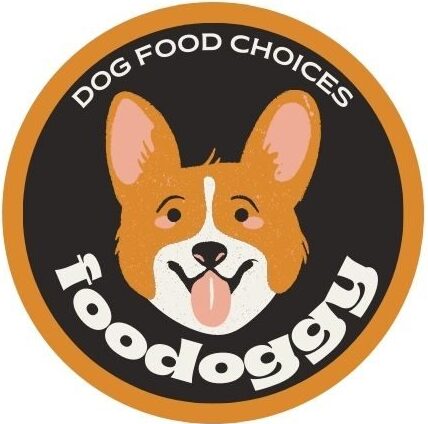You’ve just dropped a piece of onion on the floor, and before you can scoop it up, your furry pal is there, ready to gobble it up. You may think, “What’s the harm? Will a Small Amount of Onion Hurt My Dog? It’s just a small piece.” But, hold on! Onions can be extremely harmful to dogs, even in small quantities. It’s important to understand the potential dangers they pose to our four-legged friends.
In this article, we’ll dive into the reasons why onions are a big ‘no-no’ for your pooch, the symptoms of onion poisoning, and the steps to take if your dog has ingested some. We urge you to continue reading, not just for the sake of your beloved companion’s health, but also to protect them from potential harm. Awareness and immediate action can make all the difference in the world.
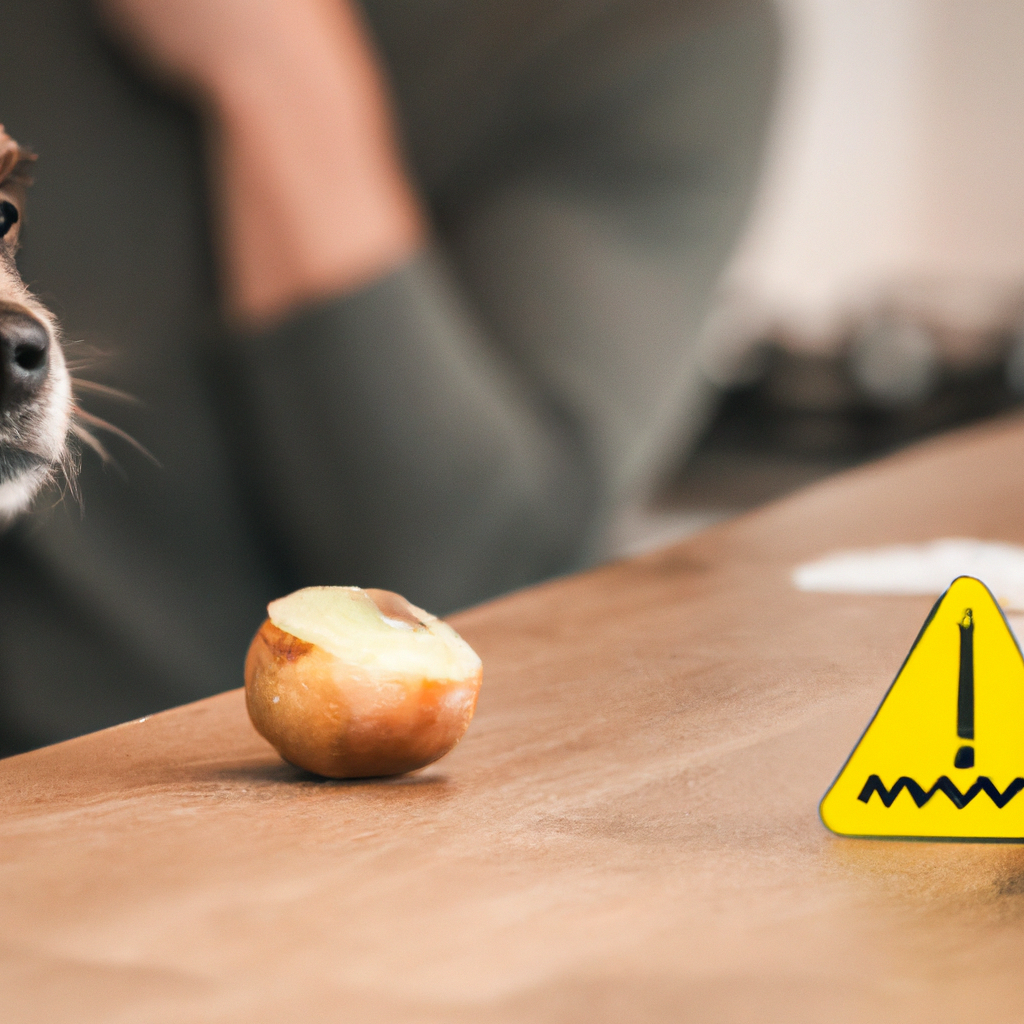
Why Onions Are Toxic to Dogs?
Transitioning from our previous discussion on common household items that can be hazardous to dogs, let’s delve into the specifics of why onions are particularly harmful.
Onions, as harmless as they may appear in our kitchens, hold a sinister secret for our canine friends. They contain an ingredient known as N-propyl disulfide. This substance disrupts the production of red blood cells in dogs, leading to a condition known as hemolytic anemia. If left untreated, this can be fatal. It’s not just the raw onions that pose a threat, but also cooked, powdered, and dehydrated forms.
Think about it. Is that splurge on a dog-friendly treat, not a better alternative to a costly vet bill or, worse, losing your beloved pet? It’s time to take action. Start by thoroughly dog-proofing your kitchen and educating others about the hidden dangers lurking in our food. Your dog’s life may very well depend on it.
Let’s make our homes safer for our furry companions, starting with eliminating the risk of onions.
Causes of Onion Poisoning in Dogs
While it’s hard to resist those puppy dog eyes begging for a bite of your dinner, it’s crucial to remember that not all human food is safe for our furry friends. Onions, for instance, can be harmful to dogs, but why?
Onions contain a compound called N-propyl disulfide. This substance can lead to a condition known as hemolytic anemia, wherein the dog’s red blood cells are destroyed faster than they can be replaced. The effects aren’t always immediate; in some cases, signs of onion poisoning can take a few days to appear.
As a responsible dog owner, it’s your duty to ensure your pet’s safety. Be vigilant about what you feed your dog, and always keep onions and other toxic foods out of their reach. Remember, even a small amount of onion can be dangerous, so it’s not worth taking the risk.
By being mindful of your dog’s diet, you can protect your beloved pet from the dangers of onion poisoning. After all, prevention is always better than cure.
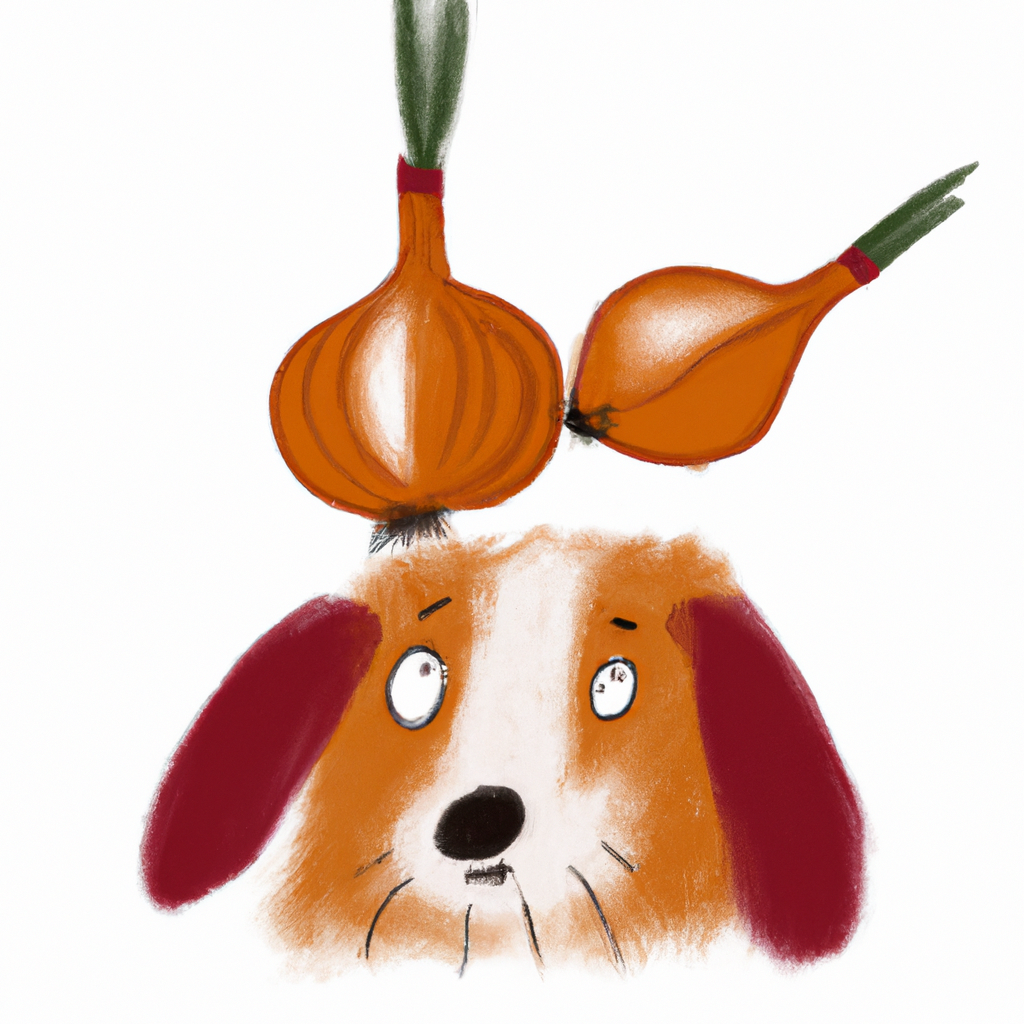
Symptoms of Onion Poisoning in Dogs
While understanding the causes of onion poisoning in dogs is crucial, recognizing the signs is equally, if not more, important. Remember, your four-legged friend cannot verbally express the discomfort they’re experiencing. Therefore, it is your responsibility to remain vigilant and be able to identify the symptoms of onion poisoning.
The first signs usually include drooling and nausea, followed by oral irritation and abdominal pain. If your dog has ingested a large quantity of onions, it may display symptoms like lethargy, pale gums, an elevated heart rate, and even collapse.
Don’t ignore these symptoms! Immediate action can mean the difference between a small discomfort and a life-threatening situation. Ensure you take your pet to a vet as soon as you notice something amiss. The health of your dog is in your hands – don’t let it slip through due to ignorance or inaction. Stay informed, stay alert, and ensure your canine companion enjoys a long, happy, and onion-free life.
Read More About vegetables on a raw diet for dogs
Diagnosis of Onion Poisoning in Dogs
Recognizing if your dog ingested a toxic dose of onion is crucial. Trust the role of your veterinarian in diagnosing, as they possess the expertise to identify the signs. Embrace the potential treatment options they recommend, as these can save your dog’s life. Prevention measures are key; keep onions out of your dog’s reach to avoid accidents. Lastly, commit to follow-up care, as it ensures your dog’s full recovery and future safety. Your dog’s health depends on your prompt action and diligence. *Be the pet parent your dog needs and deserves!
Determining if Your Dog Ate a Toxic Amount of Onion
After understanding the symptoms, your next vital step is to determine if your dog ate a toxic amount of onion. It’s not just a matter of your dog consuming onions; it’s about the amount ingested. Onions are toxic to dogs in any form, whether raw, cooked, powdered, or dehydrated. However, the toxicity increases with the quantity consumed.
A small amount might not cause severe symptoms, but large ingestion can lead to fatal conditions. Generally, the consumption of 0.5% of their body weight in onions is enough to cause toxicity in dogs. That means a 20-pound dog would only need to consume about 1.5 ounces of onion to potentially show signs of poisoning.
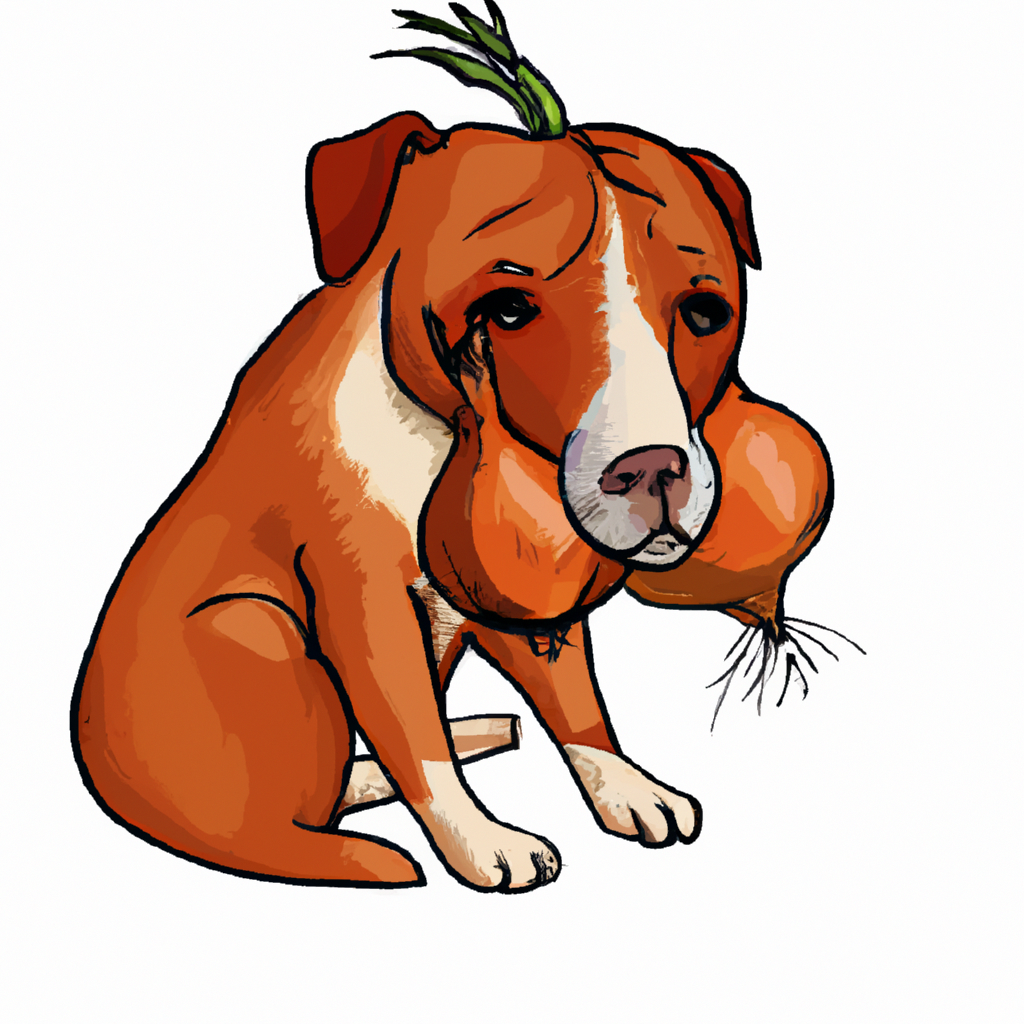
Treatment of Onion Poisoning in Dogs
Now that we’ve identified the harrowing symptoms of onion poisoning in your beloved pet, let’s move on to a topic that carries a beacon of hope: the treatment of onion poisoning in dogs. Your swift action in this regard can quite literally be a lifesaver!
Immediate veterinary care is the most effective and surefire way to combat this potentially lethal condition. Remember, your pet’s life hangs in the balance, so there’s no room for hesitation. If you suspect your dog has consumed onions, rush them to the vet without delay. Your vet will likely induce vomiting to rid your dog’s system of the toxic compounds, followed by the administration of activated charcoal to absorb the remaining toxins.
In severe cases, blood transfusions may be required. It’s a daunting prospect, but it’s crucial to remember that these measures are taken with your pet’s best interests at heart. If there’s one thing you take away from this, let it be this: Prompt action can save your dog’s life. Be vigilant, be proactive, and most importantly, be your pet’s hero.
What to Do if Your Dog Eats Onions
Having navigated through the stormy seas of onion poisoning treatment, let’s now turn our attention to preventative measures. What should you do if your dog eats onions?
Immediate action is crucial. As a conscientious dog owner, it is your duty to protect your beloved pet from harm, and this includes the harmful effects of consuming onions. It’s time to arm yourself with knowledge and take action.
Firstly, remove any remaining onions from your dog’s reach. This will prevent further ingestion and potential harm. Next, contact your vet immediately, even if your dog does not show any symptoms. Keep in mind that symptoms might not appear until hours after ingestion, and when they do, it could be too late.
Remember, this isn’t just about your dog’s health, but also about their life. It’s about those long walks in the park, the joyous play times, and the special bond you share. Do not let onions come between you and your best friend. Be aware, be proactive, and keep your pet safe.
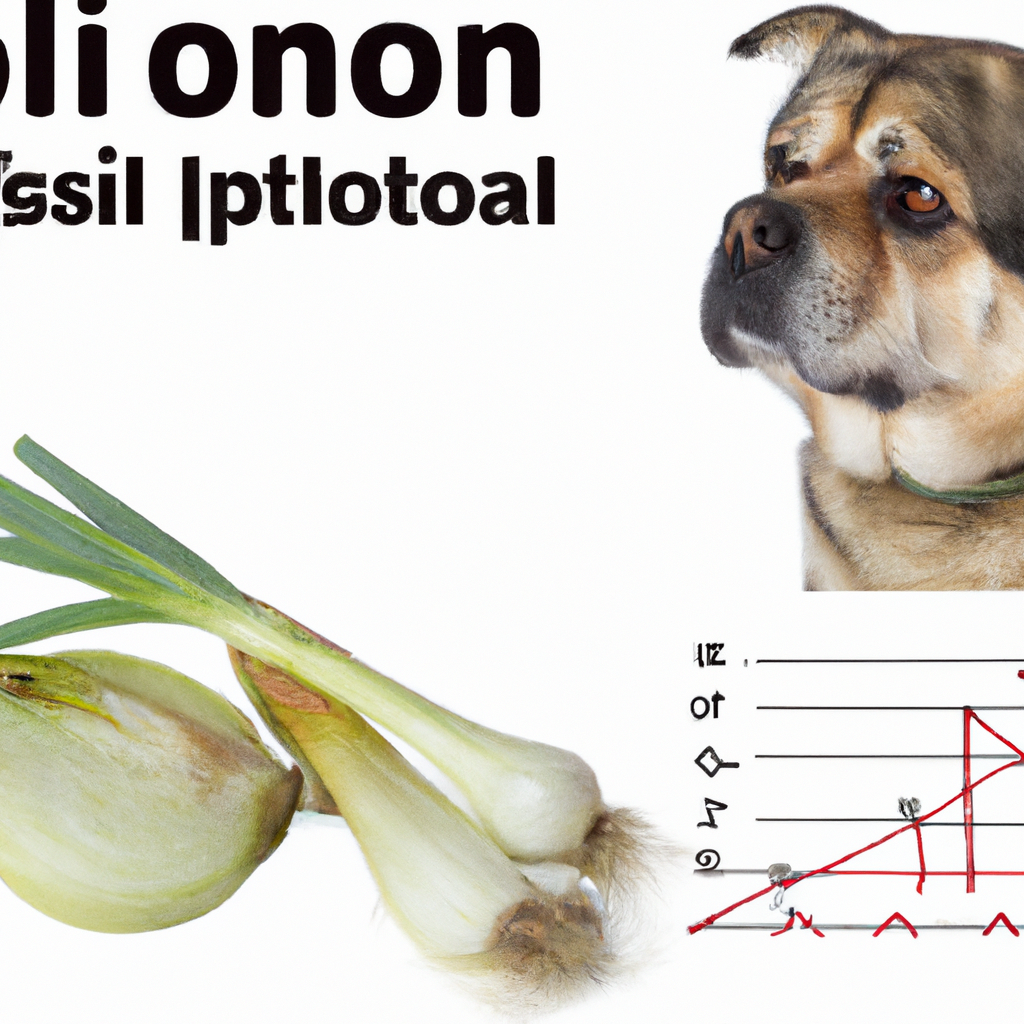
Will a Small Piece of Onion Hurt a Dog?
Now that we’ve armed you with the knowledge of what to do if your beloved pooch consumes onions, let’s address a common question that might be gnawing at your heart: Will a small piece of onion hurt a dog?
The answer is not as straightforward as you might hope. Onions, even in small amounts, can be harmful to dogs due to the presence of a toxic substance called N-propyl disulfide. This substance can cause damage to your dog’s red blood cells, leading to anemia.
However, do not panic if your dog accidentally eats a small piece of onion. The size of the dog and the amount consumed play a crucial role in how severely the dog is affected. A tiny piece of onion is less likely to cause harm to a large dog. Still, it doesn’t mean it’s safe.
Therefore, to maintain your furry friend’s health and happiness, it’s best to keep onions and food-containing onions out of their reach. Remember, prevention is better than cure.
Do Dogs Eat Green Onions?
Now that we’ve established the potential harm a small piece of onion can cause to your furry friend, you might be wondering about other types of onions, like green onions. Well, let me assure you, they’re no different!
Just as harmful as regular onions, green onions contain the same toxic compounds as their white or yellow counterparts, called N-propyl disulfide. This chemical interferes with a dog’s ability to transport oxygen through their blood, leading to a condition called hemolytic anemia. Symptoms of this condition include lethargy, decreased appetite, and pale gums.
I urge you, as a responsible pet parent, to take a firm stand against feeding your dog any form of onion. I know, those pleading eyes can be hard to resist. But remember, your dog’s health is in your hands. By keeping green onions out of their reach, you’re not just protecting them from immediate harm, you’re also ensuring a longer, healthier, and happier life for them. So, make the right choice today!
Read more about tomatoes and cucumber for dogs
Cooked Onion for Dogs?
Just as we might be tempted to sprinkle a little green onion on our dog’s meal for a flavor boost, another question might pop into your mind. What about cooked onions? Could they be a safer alternative for our beloved pets?
Well, the answer is a resounding no. Cooking does not eliminate the harmful compounds present in onions that can cause damage to a dog’s red blood cells. In fact, it may even concentrate them. You may think that a small amount wouldn’t hurt, but even minimal exposure can lead to dangerous health conditions like Heinz body anemia, hemolytic anemia, or methemoglobinemia.
Remember, dogs don’t need onions to enjoy their meals. They find their dog food delicious as it is! The risks associated with feeding onions far outweigh any perceived benefits. So, for the safety and health of our furry friends, let’s keep the onions out of their bowls and save the savory flavors for our own meals.
Conclusion
Ensuring your dog never ingests onions is of utmost importance, as even the tiniest amount can lead to severe and life-threatening onion poisoning. If you have reason to believe that your dog has consumed onions, it’s crucial to act promptly and take necessary measures, even if they appear to be unaffected.
Your dog’s health is in your hands. By being aware of the foods that are toxic to them, like onions, you can ensure their well-being. Don’t risk it, keep your dog onion-free, it’s a small sacrifice for their long, healthy life.
